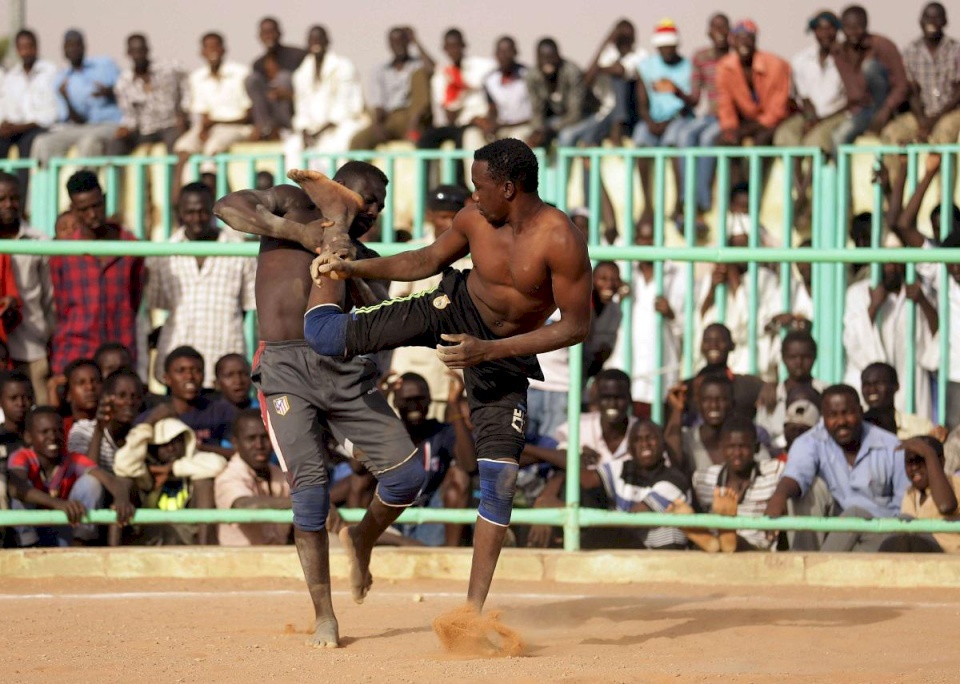
Traditional Wrestling in South Sudan: A Window for Tourism and Cultural Identity Enhancement
SadaNews - Traditional wrestling in South Sudan is not just a conventional sport; it is a folkloric ritual that combines excitement and competition, reflecting the depth of the cultural identity of local communities.
Although historically associated with the Dinka groups in Bor Yirol, the Mundari, and the Latuka in the Eastern Equatoria region, it has today become part of organized competitions attracting thousands of spectators, highlighting the importance of heritage in enhancing community belonging and communication among various local components.
With this growing momentum, traditional wrestling emerges as a window to introduce the world to South Sudan from a new perspective, not as a country of conflicts, but as a nation rich in traditions, capable of leveraging its heritage for development and tourism.
The roots of traditional wrestling can be traced back to ancient customs linked with specific community practices; however, war and displacement have contributed to its spread to other areas and cities, giving it a new dimension as a means to build bridges of communication, solidify a culture of peace, and foster a spirit of coexistence.
For pastoral groups, especially the Dinka, Mundari, and Latuka, wrestling is a well-established tradition in social upbringing, used to instill a sense of self-reliance among young males and prepare them to face life's challenges.
Young men are typically trained in cattle pastures during the summer, allowing them to gain strength, discipline, and endurance in an environment considered part of their journey toward maturity and responsibility.
In recent years, traditional wrestling has witnessed a qualitative leap, surpassing its local framework to become regular tournaments held in the capital Juba and several states, coinciding with more professional organization, establishment of local federations and clubs, and emergence of specialized coaches and teams, while the Juba Sports Stadium has become one of the main venues hosting competitions, giving this popular sport an official and increasing presence among the public.
Many analysts believe that traditional wrestling has evolved from being merely a traditional activity to becoming an important cultural and social tool that strengthens local identity, connects different communities, and contributes to instilling values of coexistence and peace.
Zakariya Nimir, a writer interested in cultural issues, states that traditional wrestling is one of the most prominent folkloric practices that embody the depth of the cultural memory of local peoples; it is not just a physical competition but rather a vibrant social space where people come together to celebrate bravery, chivalry, and inherited traditions.
He adds, in an interview with Al Jazeera Net, "With the growing organization of tournaments in cities and villages, traditional wrestling has begun attracting thousands of spectators, which opens the door to invest in cultural tourism and the entertainment industry; it also presents an opportunity to redefine the image of South Sudan globally, not as a country of conflicts but as a homeland for rich traditions capable of being a tool for development and building national identity."
Recently, traditional wrestling has gained wide popularity, with the Juba city stadium crowded with audiences from various local groups watching the matches.
The audience is not limited to locals but also includes foreigners working in embassies and groups engaged in trade, in addition to others who have not practiced the sport in their original regions, reflecting its ability to attract diverse interests and expand its audience base.
According to heritage and culture researcher Riak Dieng, traditional wrestling is an ancient practice that has been practiced since distant times, and its origins are attributed to the Kushite era according to oral narratives among the communities that practice the game, such as the Dinka Bor, Mundari, and Dinka Yirol in the Lakes State.
He adds in statements to Al Jazeera Net, "If this sport is organized more professionally, it can provide the government with opportunities to establish wrestling arenas in areas like Bor and Terkeka Yirol, contributing to enhancing social fabric and encouraging visitors from outside the country. Each season often begins with religious rituals performed by elders to avoid disputes among the fans of competing teams."
Additionally, wrestling, as a popular sport with an entertainment character, has become an integral part of the programs and festivals organized by civil society organizations in their campaigns to promote a culture of peace and reject violence.
Through this role, wrestling has transformed from merely a combat game to a message of peace and love that helps bridge communities suffering from repeated conflicts over cattle raiding and tribal disputes, fostering a spirit of coexistence and mutual respect.
Journalist Ajang Pol sees that traditional wrestling represents a source of inspiration and courage and a symbol of strength, especially in pastoral tribal areas, where these competitions gain significant momentum and pride.
Pol points out that a large number of tournaments are now held in the capital Juba among the Bor Yirol communities or Bor and Mundari at the Juba Stadium and other areas like New Side and the Corporate District, making it a meeting point to celebrate traditional skills and community pride.
He concludes his remarks to Al Jazeera Net by saying, "Such events can be benefited from by implementing laws and regulations to organize wrestling, considering individual property rights and human rights, and granting everyone a chance to practice their activity within a legally organized framework."
He added, "If this sport is organized like international matches, I believe it can unify our people and contribute to enhancing the social fabric and solidifying coexistence among various components."
Source: Al Jazeera

What Happens If You Respond to a Spam Text?

Discover Southern Tunisia.. An Exciting Journey in the Desert, Flavors, and Memories

Flick Not Satisfied with Barcelona's Performance Despite Big Win Over Copenhagen

When Illusion Prevails Over Science: The Dangers of Digital Medical Advice

Not All Cheeses Are Harmful.. 6 Healthy Types for Those Monitoring Blood Pressure

Scientific Breakthrough That Could Change Immunological Aging: What Have MIT Scientists Di...

What is the Dutch secret behind Nvidia's AI boom?

